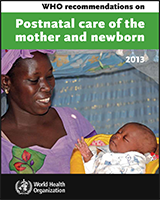The ultimate goal of these guidelines is to improve the quality of postnatal care and health outcomes for mothers and newborns. Therefore the dissemination and implementation of these guidelines are crucial steps that should be undertaken by the international community and local health care services.
Guidelines dissemination
The recommendations in these guidelines will be disseminated through a broad network of international partners, including WHO country and regional offices, ministries of health, WHO collaborating centres, other United Nations agencies and non-governmental organizations. They will also be published on the WHO website. A policy brief will be developed for a wide range of policy-makers, programme managers and clinicians, and then disseminated through WHO country offices.
Guidelines implementation
The first steps in implementation after the final approval of the guidelines will be to revise all WHO publications that deal with postnatal care. These include the clinical guides for maternal, newborn and child health: Pregnancy, childbirth, postpartum and newborn care; Managing complications of pregnancy and childbirth; Managing newborn problems; Pocket book on hospital care for children; and Safe Childbirth Checklist. The existing training package, Essential newborn care course, will also be updated, as well as the related tool for computer-assisted learning. The recommendations will also be incorporated into community level tools including Caring for the newborn at home. In addition, service standards for the immediate care of the newborn, care of the umbilical cord and routine postnatal care for the mother and the neonate will be developed. These tools will be made available as printed materials or in electronic format. They are already used in a majority of target countries.
The successful introduction of evidence-based policies related to postnatal care into national programmes and health care services depends on well-planned and participatory consensus-driven processes of adaptation and implementation. These processes may include the development or revision of existing national guidelines or protocols based on this document.
The recommendations contained in the present guidelines should be adapted into locally-appropriate documents to meet the specific needs of each country and health service. Modifications to the recommendations, where necessary, should be limited to weak recommendations and justifications for any changes made in an explicit and transparent manner.
An enabling environment should be created for the use of these recommendations, including changes in the behaviour of health care practitioners to enable the use of evidence-based practices. Local professional societies may play important roles in this process, and an all-inclusive and participatory process should be encouraged. WHO's MCA Department has substantial experience of introduction of WHO guidelines and tools into national programmes.
Monitoring and evaluating guidelines implementation
Monitoring and evaluation will be built into implementation, in order to provide important lessons for uptake and continued implementation. With regard to monitoring and evaluation of their impact on quality of care, priority will be given to the strong recommendations.

